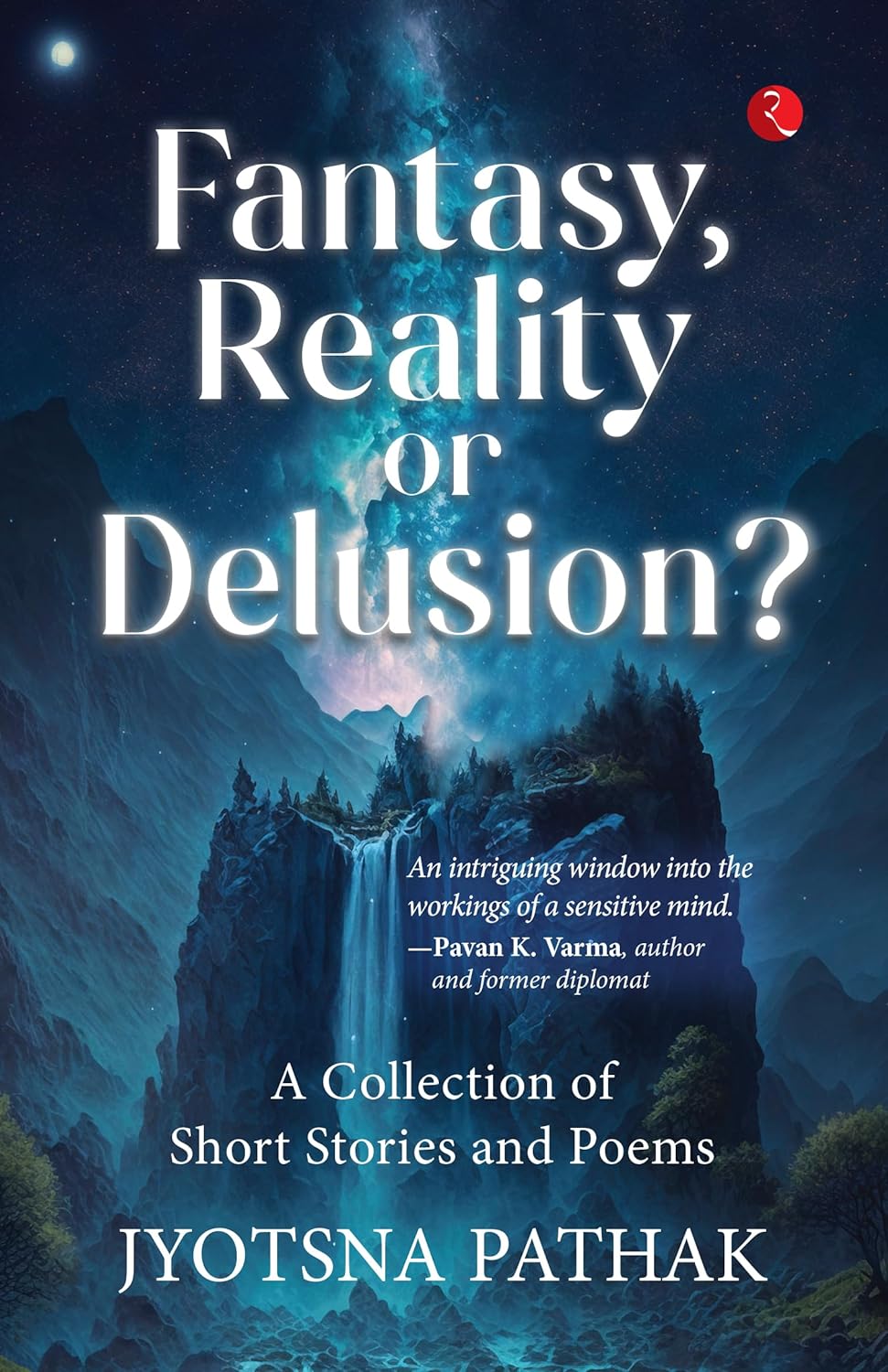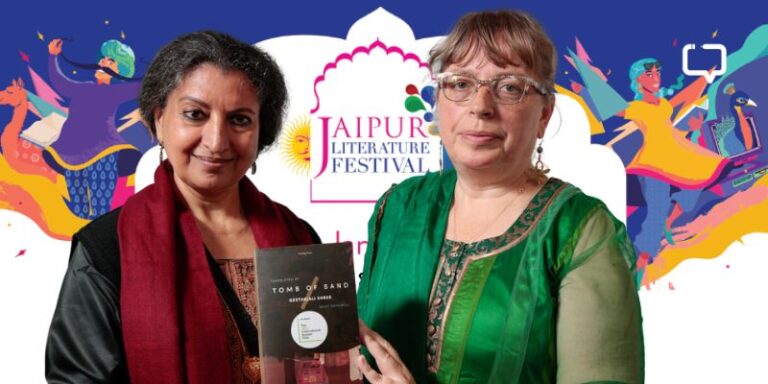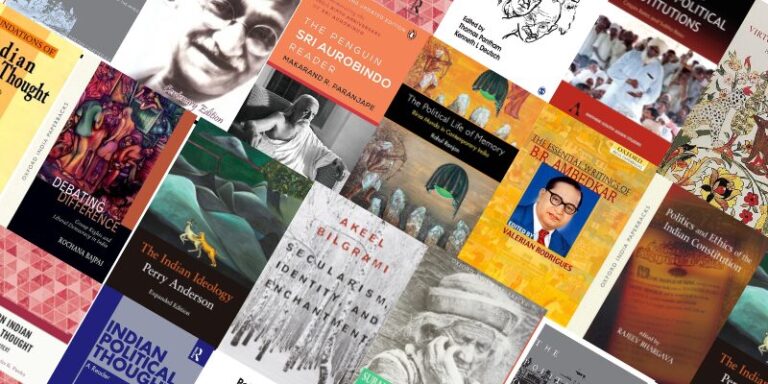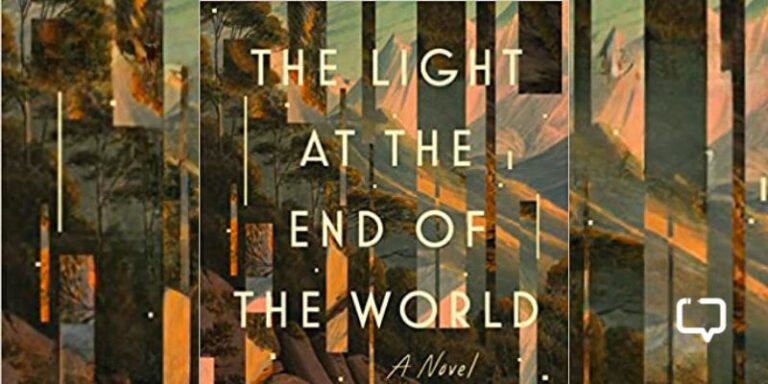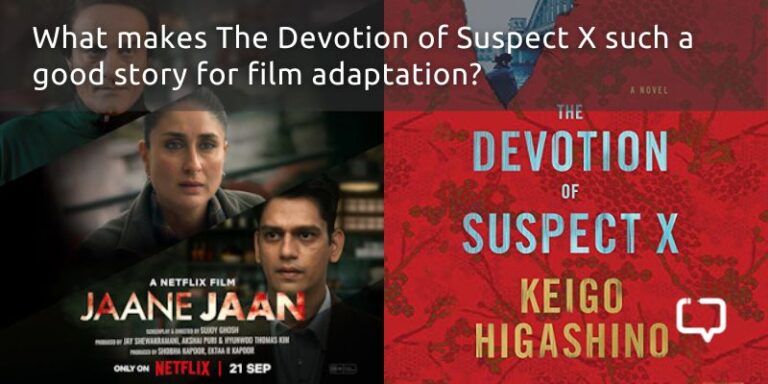Sourima Rana reviews Fantasy, Reality or Delusion by Jyotsna Pathak (published by Rupa Publications, 2024).
The American writer Stephen King, the “King of Horror”, talks about the innate human fascination with everything spooky and grotesque. According to him, “horror fiction is like a central subway station in the human psyche” – the train carrying the readers to the twin destinations of fear for the gruesome creatures and pleasure derived from catching glimpses of the unthinkable. Horror fiction is almost always an allegory – gateways to the psychic, untapped places of the human mind – the ill, the evil and everything in between.
Jyotsna Pathak’s debut anthology professes from the very title itself to blur the distinctions between fantasy, reality and delusions – leaving behind a wake of questions in every short story and poem. The book sports a blue-tinged cover, portraying an otherworldly starry sky over a waterfall at the tip of a mountain that pours forth into a vast chasm surrounded by ghostly trees. It sets the tone and flavour of the book – one of delving into the uncharted recesses of the mind and spinning fantastical stories out of it.
The book contains four poems and eleven stories intertwined seamlessly through similar themes and unique messages. The first story, Atonement, is a gruesome tale that sends chills through the readers’ spines and leaves them puzzled over the ending. It spans numerous genres—from gothic horror to criminal/detective—raising questions about cruelty, guilt, remorse, vengeance, and atonement.
It is probably the second spookiest tale in the collection, blurring the lines between fantasy and delusions to the extent that everything is a blazing question mark. It leaves the readers doubting if the narrator is still alive or dead; was he recounting his own experiences or the mythic lore of a psychopath, or was it just a terror dream in the depths of one’s unconscious?!
Themes Based on Book Title
All the writings are interconnected thematically. If one splits the title into three parts, the stories Staying Up, Hallucination, and Fantasy deal with the power of DELUSIONS, whether a product of a mind suffering from mental health disorders or drug abuse. Like typical short stories, the reader is left with endings with sudden, almost jarring twists. The last two, especially, show, in a Freudian manner, how dreams are the gateways to the unimaginable realms of the fantastic and how they can seem more real than reality itself.
There is a reference to the “brain in a vat” Cartesian skepticism theory, which states that it is all about the brain/mind, which can conjure up one’s whole experience of living. The book also hints at the possibility of the existence of parallel worlds, where the narrator is more than a normal human being trying to save the world or able to travel to different ages in history through mirrors magically.

The other group of works shows a transformation of a kind, dealing with the effusive boundaries of the titular FANTASY AND REALITY mixing. This is seen in the poem Tipping House and the stories Paradise and Runaway—all of which share a similar theme—that of exotic fairytale-like worlds. Paradise has a moment of lucid dreaming, where one’s favourite childhood fantasy world comes true miraculously to form a lush green, picturesque landscape called ‘Mirabili’, meaning wonderful.
However, in the poem and the story Runaway, the initially beautiful Studio Ghibli movie-style idyllic countryside atmosphere takes a darker turn to show its diabolical underbelly. It describes a cursed land that appears alluring but deadly, where the narrator is stuck forever, abducted from reality, and condemned to an unreal life.
The Futuristic, the Moralistic and Criminal Stories
The best, spookiest story in the entire collection is Agenda, a satire on contemporary politics, war, and unethical scientific developments. Exploiting sci-fi tropes reminiscent of the terrifying movie Glob and creating a haunting Junji Ito-esque atmosphere, Pathak creates a harrowing story of a fictitious woman’s moments before her non-consensual disappearance, used as a guinea pig in a futuristic biological warfare weapon.
It is terrifying because, much like the TV series Black Mirror, it has the potential to become a reality soon – where humans can be controlled and liquidated literally by a minority with nefarious intent. The tension this story creates is akin to another story (I Was All Over Her) in the collection, where the mythical idea of a doppelganger is explored – and true to the pessimistic atmosphere of the book, the doppelganger is a harbinger of evil.
A few write-ups have the moral message of the distinction between what’s apparent and what is the truth buried. This can be seen in the poem Oh Dear Jamie, which has an innocent start, seemingly describing an interesting little girl until it takes the dark twist usually reserved for short stories. It reveals how people with mental diseases suffer themselves but are stigmatised by society. It is a plea for mental health awareness, to investigate the root issue to achieve a solution, as well as a moral about “poison ivy hiding beneath daisies”.
Exploring the Bigger Questions
While much of the book merely touches upon the grander questions of life – like the future of humanity, the progress of science, and the quantum possibilities of the universe; the opening poem, Au Claire de la Lune, is the only departure from the interconnected thematic structure of the book. It is a reflection of humanity’s inconsequential position in the universe, which is infinite, eternal and spooky – and the awe it inspires, which is humbling.
Recommended Reads: Spook and Supernatural: 10 Horror Books You Simply Cannot Miss
This introspective mood, the theme of questioning the meaning of life, pervades the book’s entirety. Nature’s capacity for remembrance, too, is captured; however, it is not the universe in control but the human mind – as explicated in the stories. Loneliness and Depression are the running themes of each of the writings. It is precisely because of the unhappiness and disenchantment with one’s present reality that these fantastical worlds are born. It is both a solace and refuge from a cruel world and also a malaise; as taken to extreme heights, it becomes debilitating and a new twisted trap of one’s own creation.
Pathak’s Writing Style
Jyotsna Pathak effortlessly blends a blurring of genres to create her own witchy mixture of fantasy, reality and delusion. Using simple language and simple tropes, she makes it easy for readers of any level to access her books and ponder their messages. The open-ended nature of the stories with accompanying twists makes them all the more interesting and shows her skill. Pathak’s stories are allegorical and mind-bending, defying logic and neat endings.
According to Stephen King, “The arts are obsessional, and obsession is a dangerous game.” Unravelling and getting lost in Jyotsna Pathak’s beautifully crafted stories is an enchanting game as long as one remains grounded in the real world.
The same moral is imparted through the story “Poison Tree”, almost reminiscent of William Blake’s poem of the same name – that “all that glitters isn’t gold” and that one should be careful of one’s associations and people’s true intent. XOXO, the Antique Burglar and What A Beautiful Rose! are stories that fall under the criminal genre – focusing on the theme of truth obstructed, using tropes from detective fiction. They are perhaps the most thrilling stories in the entire collection, taking one on a haunted joyride in Jyotsna Pathak’s amusement park of words, full of betrayals and heartbreaks.
Favourite Quote from Fantasy, Reality or Delusion by Jyotsna Pathak
Deep where the sunshine glows
Underneath the plaque of night and day,
Down where the stars dance in the sky.
Beneath the stone of freedom, you may
Find where the secret stays…… Now only you and I know what’s a fantasy to them is a reality I lived.








